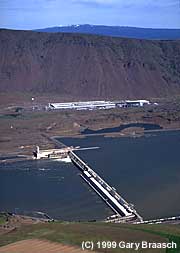Several weeks ago in this magazine, Sara Patton of the NW Energy Coalition uncorked an acidic rant against the aluminum industry (and its lackeys in Congress) for strong-arming the Bonneville Power Administration into providing the industry with below-market electricity rates.

Aluminum plant on the Columbia River, Wash.
There is still no agreement on paper, but it looks as though the Pacific Northwest’s aluminati (Patton’s coinage, not mine) will get a deal far sweeter than the one Bonneville originally offered. Sources say BPA has extended its deadline for setting rates because two aluminum smelters have said yes to the proposed deal, two have said no, and one remains undecided.
In addition to below-market prices, the pending deal would peg electricity rates to the worldwide price of aluminum. Should the price of aluminum drop, so will the price the industry pays for power. Not bad.
(Muckraker wonders whether we can get our cable TV and phone rates reduced should our consumption of pay-per-view movies and long-distance calls outpace the girth of our wallet. We don’t view this as likely, however, because we don’t make campaign contributions or employ nattily dressed lobbyists.)
Most of the Pacific Northwest’s congressional delegation reportedly complained to Energy Secretary Bill Richardson that the deal Bonneville originally came up with was not good enough and could threaten aluminum companies and the jobs they create. (Proponents say the number of jobs at stake is around 40,000; opponents use a much lower number).
We heard that Sen. Patty Murray (D-Wash.) was upset over the pending deal, but a source in her office explained that Murray simply wants to see an agreement that doesn’t threaten BPA’s fish-protection budget, increase electricity rates for individual customers, or unduly burden aluminum makers whose greatest cost, by far, is electricity.
Is such a best-of-all-possible-worlds solution conceivable? If the Senate’s efforts to craft a perfect deal on chemical storage facility worst-case scenario reports is any indication, we would say definitely not …
Don’t Ask, Don’t Tell
On that front, if you’re still looking to cruise the web for a copy of the disaster scenario report for the chemical storage facility nearest you, don’t hold your breath.
Looks like the deal-making in the Senate that we reported on last week has produced a bill that will hold up distribution of the information by the EPA for at least a year and perhaps for good.
Under the Clean Air Act, facilities storing volatile chemicals were required to file worst-case scenario disaster reports by June 21. EPA had originally planned to take those reports and post them immediately on the Internet for anyone with a web browser to peruse.
Not so fast, said the FBI and others, arguing that the last thing we should do is provide a road map for terrorists trolling for inviting targets.
Senators on the Environment and Public Works Committee — notably James Inhofe (R-Okla.), Max Baucus (D-Mont.), and Frank Lautenberg (D-N.J.) — went to work trying to draft a bill that would get the information out in some fashion without creating a security threat.
Well, it didn’t exactly work out that way. Last night the committee agreed on a bill — expected to sail through both houses of Congress — that would exempt the worst-case scenario information from the Freedom of Information Act (FOIA) for one year. During that time, the administration is supposed to come up with a method to systematically release the information, without simply dumping it on the Internet. If the administration is successful, the FOIA waiver could be extended for six years. If, however, no rule is adopted within the year, the waiver would expire and all the reports would be subject to FOIA requests. Unless of course they come up with another last-minute fix to keep the information secret …
Michael Newman, who tracked the bill for the Sierra Club, said the final product protects industry while keeping citizens in the dark about the real threats that surround them.
“If there was truly a concern about security, then Congress would take steps to address site security,” Newman said. “This bill does not address site security. Nor does it do anything about the very real threat of chemical accidents which happen every day in this country.”
Brother Jeb
Texas Gov. George W. Bush‘s (R) handling of environmental issues in the recently completed Texas legislative season got a great deal of ink (particularly in this column), but now another of the Brothers Bush is in hot water with enviros.
Florida Gov. Jeb Bush (R) recently signed a bill that would make it easier for developers to argue that regulations written by state agencies exceed the government’s authority. Sounds a lot like some of the arguments in Washington of late regarding the federal bureaucracy’s legal right to write binding regulations.
Bush’s top enviro official, David Struhs, originally encouraged Bush to veto the bill but had a death-bed style conversion and changed his tune entirely. What happened? Struhs says he became convinced the legislation would not, in fact, result in the relaxation of state enviro laws.

